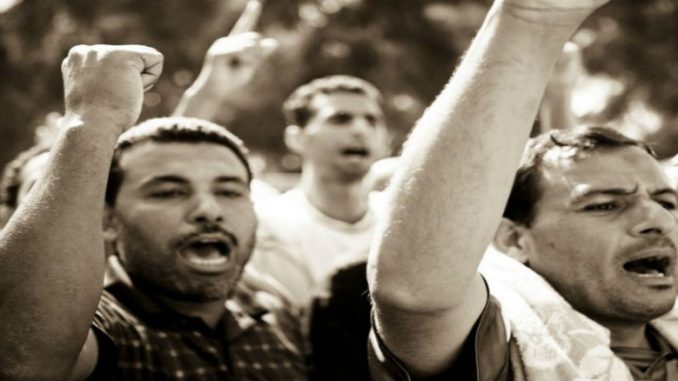
Amnesty International released a report on the relentless assault on rights of workers and trade unionists in Egypt, saying that dozens of workers and trade unionists in Egypt have faced arrest, detention, dismissal from work or trials in military courts, merely for exercising their freedom of expression, association and assembly.
The report published to mark Labor Day on 1 May stated that amid rising economic hardship in Egypt and a wave of labor strikes in the private and public sector, as well as military-owned industries, “the government is using a series of disciplinary measures and criminal sanctions to crack down on workers and trade unionists. It is also seeking to amend existing laws to further restrict labor rights.”
Najia Bounaim, Campaigns Director for North Africa at Amnesty International,”The Egyptian authorities have waged a punitive campaign against workers and trade unionists to deter and punish them from mobilizing or going on strike”
She added,”Demanding your labor rights and expressing your grievances should not be a criminal offence. The right to strike and peaceful assembly are enshrined, both, in Egypt’s Constitution and international human rights law. Egyptian authorities must stop punishing people for exercising and demanding their rights.”
The Egyptian authorities have arrested many workers for simply taking part in a strike or a peaceful protest. Some have been held in pre-trial detention for prolonged periods or subject to restrictive probation measures.
Last week, 16 workers from the Telecom Egypt Company in Cairo and Giza were arrested for participating in a peaceful demonstration under Egypt’s anti-protest law. They were released after solidarity protests.
In other cases, disciplinary measures including pay cuts, suspension or dismissal from work are used to punish workers.
At the state-run Zagazig University Hospital, 12 nurses were suspended after participating in a week-long strike in February 2017 during which the hospital provided only emergency services.
Moreover, workers in military-owned factories face additional risks as they can be subject to unfair trials at military courts.
It is worth to mention that twenty five workers from the military-run Alexandria Shipyard Company are currently on trial before a military court. They have been charged with “inciting workers to strike”, and could face up to two years in prison.
In addition, authorities have also interfered with the functioning of independent workers unions, by targeting members with disciplinary action and by hampering their activities.
Furthermore, the government has also proposed amendments to the Labour Law and Trade Unions Law that will make organizing strikes even more difficult and will make it virtually impossible to establish or join an independent trade union.
Since the military coup that ouster Mohamed Morsi, the first democratically elected president, Egyptian security forces have waged a relentless crackdown arresting thousands of his Islamist supporters as well as prominent liberal and secular activists.
Hosni Mubarak, the former dictator who ruled Egypt for 30 years before being overthrown by January Revolution 2011, kept a tight lid on labor unrest during his power, permitting only state-controlled unions in a tradition dating back to the days of socialist leader Gamal Abdel Nasser.
However, the independent unions began organizing protests last years of Mubarak’s reign, and the workers have played a major role in the 2011 revolution.
Therefore, organized labor has been under intense scrutiny by the Egyptian security forces who returned powerful after the 2013 military coup.
Even foreigners interested in Labor unions have been put under observation. On the anniversary of January Revolution in 2016, an Italian doctoral student who had been writing his thesis about independent unions was found tortured to death. Giulio Regeni disappeared when security forces were out in the streets of central Cairo.
Police have denied any involvement, but the torture on his body has the signs of the Egyptian security forces. Italy withdrew its ambassador, saying Egypt was not fully cooperating in the investigation.



